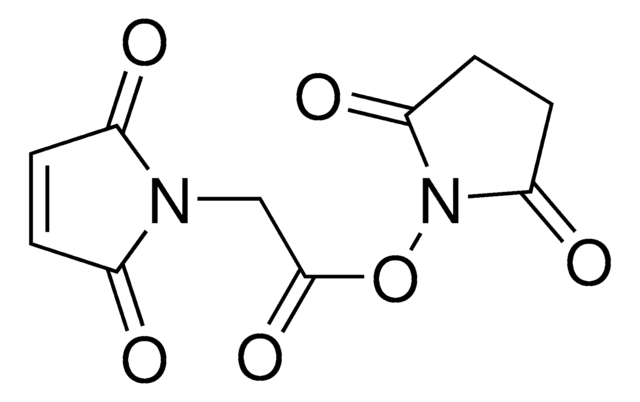M9794
6-Maleimidohexanoic acid N-hydroxysuccinimide ester
≥98%, powder
Synonym(s):
6-Maleimidocaproic acid N-succinimidyl ester, N-(ε-Maleimidocaproyloxy)succinimide, N-Succinimidyl 6-maleimidocaproate, EMCS
About This Item
Recommended Products
Quality Level
Assay
≥98%
form
powder
reaction suitability
reagent type: linker
mp
70-73 °C (lit.)
solubility
chloroform: 100 mg/mL
DMF: soluble (lit.)(lit.)
functional group
NHS ester
storage temp.
−20°C
SMILES string
O=C(ON(C(CC1)=O)C1=O)CCCCCN2C(C=CC2=O)=O
InChI
1S/C14H16N2O6/c17-10-5-6-11(18)15(10)9-3-1-2-4-14(21)22-16-12(19)7-8-13(16)20/h5-6H,1-4,7-9H2
InChI key
VLARLSIGSPVYHX-UHFFFAOYSA-N
Looking for similar products? Visit Product Comparison Guide
Related Categories
Application
Signal Word
Warning
Hazard Statements
Precautionary Statements
Hazard Classifications
Carc. 2 - Eye Irrit. 2 - Skin Irrit. 2 - STOT SE 3
Target Organs
Respiratory system
Storage Class Code
11 - Combustible Solids
WGK
WGK 3
Flash Point(F)
Not applicable
Flash Point(C)
Not applicable
Certificates of Analysis (COA)
Search for Certificates of Analysis (COA) by entering the products Lot/Batch Number. Lot and Batch Numbers can be found on a product’s label following the words ‘Lot’ or ‘Batch’.
Already Own This Product?
Find documentation for the products that you have recently purchased in the Document Library.
Customers Also Viewed
Our team of scientists has experience in all areas of research including Life Science, Material Science, Chemical Synthesis, Chromatography, Analytical and many others.
Contact Technical Service











